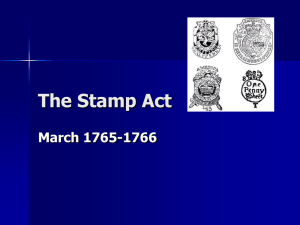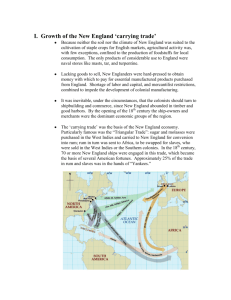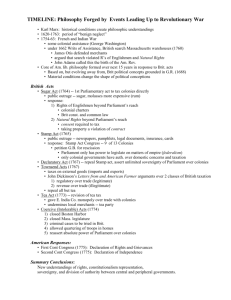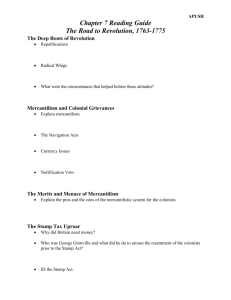Navigation Acts & Colonial Tensions: French & Indian War
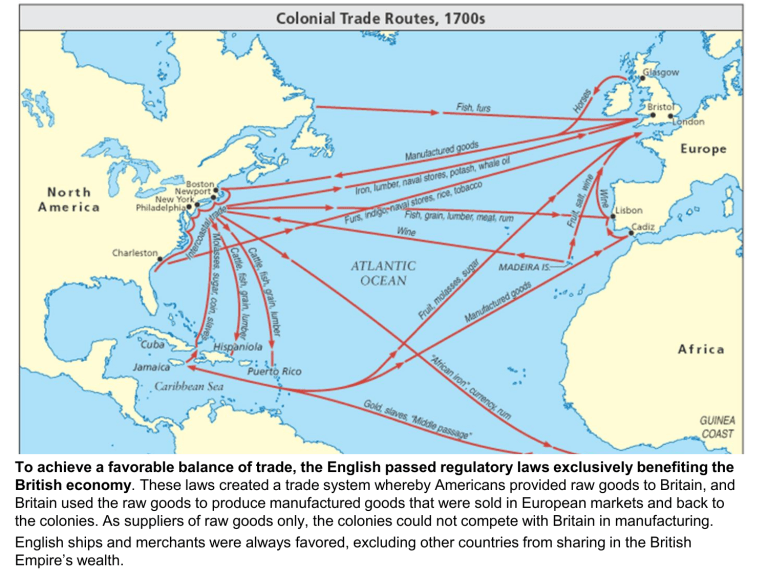
The Navigation Acts
To achieve a favorable balance of trade, the English passed regulatory laws exclusively benefiting the
British economy . These laws created a trade system whereby Americans provided raw goods to Britain, and
Britain used the raw goods to produce manufactured goods that were sold in European markets and back to the colonies. As suppliers of raw goods only, the colonies could not compete with Britain in manufacturing.
English ships and merchants were always favored, excluding other countries from sharing in the British
Empire’s wealth.
•
Between 1651 and 1673, the English Parliament passed four Navigation Acts meant to ensure the proper mercantilist trade balance.
• In England, the Navigation Act of 1651 prohibited foreign vessels from engaging in coastal trade in England and required that all goods imported from the continent of
Europe be carried on either an English vessel or a vessel registered in the country of origin of the goods.
• In addition to the requirement that only English or English colonial ships could carry cargo between imperial ports, the acts declared the following:
– Certain goods, including tobacco, rice, and furs, could not be shipped to foreign nations except through England or Scotland.
– The English Parliament would pay “bounties” to Americans who produced certain raw goods, while raising protectionist tariffs on the same goods produced in other nations.
– Americans could not compete with English manufacturers in large-scale manufacturing.
•
The Staple Act of 1663 extended the Navigation Act by requiring that all colonial exports to Europe be landed through an English port before being re-exported to
Europe.
•
The Navigation Acts severely restricted colonial trade, to the benefit of England.
•
The colonies were captive markets for British industry, and the goal was to enrich the mother country.
•
The colonists initially complained about these strictures/limits on trade.
•
In actuality, the flow of commodities in the Triangular trade would have naturally flowed the way they did even without regulations on trade due to the needs and wants of the markets involved.
•
Nonetheless
, colonists didn’t particular like restrictions telling them what they could or could not make, who they could buy from or sell to, etc ….
•
The imposed regulations that allowed the colony to only produce raw materials and to only trade with Britain led to friction with the inhabitants of these colonies, and mercantilist policies (such as forbidding trade with other empires and controls over smuggling) were a major irritant leading to the American Revolution.
• In New England in particular, many colonists evaded the restrictions of the Navigation Acts by smuggling.
•
But although relations between England and the colonies were often full of friction (as in
1684, when Charles II revoked the Massachusetts Bay Colony’s charter as punishment for smuggling), the two sides never came to any real conflict.
Competition over resources and markets and the inter-colonial rivalries resulted in numerous wars that involved and affected the colonists.
Inter-colonial conflicts (imperial wars):
Anglo-Dutch Wars (First, Second, and Third)
King George’s War
King William’s War
Queen Anne’s War
French and Indian War
“As time went by, and colonial economies grew, especially along the eastern seaboard,…the imperial wars of the late 17th and early 18th centuries (listed above), with a newly interested England paying some —but by no means all—of the costs of colonial wars,…. brought about a boom in ship building, which not only made money for the owners of shipyards, but also ensured full employment for shipwrights of all kinds. Good employment opportunities also occurred in the shipping trade itself, with sailors and shore men kept busy by the upturn of trade during the war, based in large part on the movement of provisions for armies. Other young men, some without much economic hope or marketable skills, found employment in the volunteer provincial armies being raised. Thus, war brought a miniboom in the colonial economy along the Atlantic seaboard. Yet, the ending of the war usually brought about an economic bust —shipwrights, sailors, and soldiers were sent home and war provisions were no longer needed.
Worse yet, the war now had to be paid for, with a sharp rise in colonial taxes to pay the war debt. This cycle was devastating for Boston, which was intimately tied to the imperial wars because of its closeness to the military front in French Canada, while New York and Philadelphia saw less distress with each postwar economic bust .”
The British government decided to end the long-term struggle with
France once and for all.
During the French and Indian War, troops, ships, and money were poured into the American colonies to win the war.
The vast scale of fighting during this period had never before been witnessed in America.
Massive British regular armies and their provincial counterparts attacked the French throughout Canada, on land and by sea.
The costs were enormous; the British easily spent £5 million themselves and sent another £1.4 million to the various colonies to pay them back for their war expenditures, causing a huge boom in the colonial economies of New York and Philadelphia (much less so in economically troubled Boston) as shipbuilders, war suppliers, contractors, and laborers of all kinds took advantage of the influx of money into the colonies.
Yet, the aftermath of the war, despite its victorious outcome, was disastrous for British and Americans alike.
The debt Britain incurred during the worldwide war, added to its prewar debt, caused it to seriously worry about how to pay its bills, especially since England had also, with the conquest of Canada, taken on new, expensive responsibilities in the world.
Many American colonies, despite the British reimbursement for some of their war expenditures, were also deeply in debt by the end of the war, and the prospect for repayment looked bleak —given the fact that the end of the war meant the return of an economic downturn. The cycle of boom and bust of the American economy during the 18th century was directly related to the economy of imperial wars, and for most Americans, the cycle was not a comforting one. Yet, from 1765 to
1775, the cycle would shift in a different direction —a direction that ultimately would lead to American independence.
The French and Indian War:
Remember: The main cause of French and Indian War was France and Britain’s competing claims over land.
During the war British troops and colonial militia fought side by side.
The first British Empire truly reached its pinnacle of size and strength following the British victory in the French and
Indian/Seven Years War with France and the ensuing Treaty of Paris (1763).
As a result of the French and Indian War, France turned Canada over to Britain.
The French and Indian war ultimately led to a weakening of colonial loyalty toward Britain.
In terms of British-American relations after the war, the colonists began to question British authority.
Proclamation Line 1763
• After the British defeated the French in the French and
Indian War and seized their North American holdings in
1763, the British government hoped that such conflicts would subside.
•
However, tensions remained high between Native
Americans and English colonists, resulting in a series of attacks and counterattacks between the two groups.
•
Not wanting to maintain a large military presence in this interior region of the continent, King George III issued the
Proclamation of 1763, declaring that no British colonists could settle west of the Appalachian Mountains.
•
The Proclamation Line of 1763 marked an attempt by the
British government to limit westward expansion until natives in newly acquired territory could be pacified and defense/control could be maintained/strengthened by
10,000 British troops stationed/assigned to defend it.
• The Appalachian Mts. were where the line of demarcation was drawn.
• Colonists already living beyond Appalachians were encouraged to come back (perceived threat —e.g.
Pontiac’s Rebellion)
•
The majority of colonists despised the proclamation, and it became one in a long list of colonial grievances against the British.
Quartering/Billeting Act
• The act(s) required all colonial assembles to furnish food, supplies and salaries to soldiers stationed within their respective provincial boundaries.
– The requirement was not a direct tax; rather it was an order for colonial assemblies to, in effect, tax themselves; thus, this was regarded by colonists as a form of taxation w/o representation, that is, unless colonial assemblies had the right to refuse the order or to comply with it insofar as they pleased.
– The New York Colonial Assembly was careful not to fully comply in an effort to make this point clear. The British Government responded to this obstinate behavior by instructing the NY Governor to veto (i.e. disallow/forbid the enactment) every measure passed by the New York Assembly until it fully complied with the Quartering/Billeting Act.
**These measures only intensified the conflict(s) that emerged over British attempt(s) to pacify the Amerindian groups in Indian territory by stationing British
Regulars along the new frontier and by establishing a Proclamation Line.
• When be became the new British Chancellor of the Exchequer in 1763, George Grenville discovered from the treasury books that the American Customs Service (established to control trade through tariffs, imposts, duties, etc.) was actually costing more to operate than it was bringing in in revenue (suggesting that colonial merchants/manufacturers were evading the Navigation Acts by smuggling).
• Grenville was determined to tighten up the service (that is, to prevent smuggling).
• Prior to this, the British policy of salutary neglect ( i.e. the trade laws that most hurt the colonial economy were not enforced ) allowed the colonies more economic freedom.
• British officials were not very effective at enforcing the mercantilist policies they espoused.
• The enactment of laws regulating trade (e.g. Navigation Acts) was not the same as actual enforcement of those laws (the British government lacked the resources to stop the smuggling that the prohibitions on trade would create).
• Because so many British officials competed for a share in the monopoly/cartel profits created by mercantilist restrictions on trade, it seemed less worthwhile to either seek or enforce mercantilist restrictions.
• Threatened by the presence of the French in North America, British officials knew that at some point they would have to clash with the French over the domination of the continent, and they needed the colonists to support them when that time came.
• The British did not want to alienate their much-needed allies through aggressive trade restrictions.
• In addition, the colonies were placed on the back burner due to the fact that the AngloFrench rivalry hadn’t played itself out yet and the English Civil War/power struggle between the monarchy and Parliament was still raging (i.e. the British were distracted). That would all change following the Glorious Revolution (1689) and the Treaty of
Paris (1763) whereby the French were ultimately defeated as England’s great rival.
•
In fact, one of the reasons England was so prosperous during the mercantilist era was that mercantilism was not well enforced.
Grenville contd.
• Changes initiated by Grenville :
– Stricter enforcement of the Molasses Act
(purpose to collect $; a novel idea); Americans at once pointed out that the sixpence (a coin worth the sum of six pennies) duty/tax on foreign molasses was prohibitive and would ruin those industries that had to pay it. Though Grenville, didn’t intend to destroy those industries, he did intend to make it furnish a revenue; so he kept the duty but cut it in half.
– Overhaul of the Customs system (attempt to begin to collect taxes); an elaborate series of papers would now be filled out by shippers for every cargo.
Violations were to be tried in Admiralty Courts
(established in large part because colonial juries were notoriously easy on smugglers).
Portrait of George Grenville (1712 –1770) by William Hoare (1707-1792).
• The Admiralty Court at Halifax Nova Scotia was used to try navigation violations (the court’s jurisdiction/enforcement power was extended to include new laws passed by Parliament in addition to all laws of trade and navigation as well as ordinary maritime laws/matters).
• Admiralty Courts were “prerogative courts,” that is, they were composed not of juries but of single judges whose posts were “political offices in the hands of the royal governors, to be bestowed upon deserving friends and supporters.”
• Those colonists tried in Admiralty Courts were stripped of the invaluable privilege of trial by jury; a crucial protection under the British
Constitution (the colonists felt Parliament could not curtail the right of trial by jury; it was a check on executive power).
The British navy was instructed to enforce the Navigation Acts.
Stamp Act (1764)
• Proposed by Grenville and approved by Parliament (March, 1765);
– law went into effect during November 1765.
– designed to defray cost of maintaining troops in British colonial North
America.
– Almost anything formally written on or printed (lawsuits, diplomas, deeds and wills, almanacs, advertisements, bills and bonds, customs papers, newspapers, marriage certificates) would have to be on special
“stamped” paper shipped from British Central Stamp Office in London to agents in colonies who would dispense it only after tax was paid as proof it was paid.
• The Stamp Act aroused 2 particular groups: lawyers and printers (lawyers held a large number of the seats in colonial assemblies).
Stamp Act
• Even though official aim of the act to raise $, the sums it brought in were quite small
•
To colonists, herein was the danger:
– Because the sums involved were quite small, “some persons…may be inclined to acquiesce under it.” (i.e. the smaller the taxes, the more dangerous they were b/c they would the more easily be found acceptable by the incautious)
– This would establish a precedent by the tacit submission of the colonies; thus, if this attempt was successful (more likely if the tax was small), Parliament would pass other laws which would impose further taxes.
• Americans were equally concerned with setting dangerous precedents.
• John Dickinson spoke of the danger posed by the fact that Stamp
Act dues were small (and thus seemingly more acceptable to the less weary):
“Nothing is wanted at home but a PRECEDENT, the force of which shall be established by the tacit submission of the colonies…If the Parliament succeeds in this attempt, other statutes will impose other duties…and thus the Parliament will levy upon us such sums of money as they choose to take,
without any other
LIMITATION
than their
PLEASURE.”
Colonial response(s) to Stamp Act
•
Requested with all due humility that
Parliament repeal the tax
•
Boycott (non-importation agreements)
—attempt to get British merchants/manufacturers, a powerful voting bloc in a country of shopkeepers and traders, to feel the pinch from the lack of business with the colonies in the hope they would bear pressure on their representatives to rescind the tax.
•
Intimidate stamp distributors by vandalizing their property or threatening them with mob violence
(e.g. “tarring and feathering”), thus they would do nothing to execute the act (next slide).
•
Civil disobedience (principle of nullification and non-compliance);
– do nothing that required the stamps
– Proceed without using required stamps
– Based on the principle that the law was unjust b/c it taxed the colonists w/o their consent —remember, the law and ethics are not always in agreement.
– Radical response:
•
Some saw it as an attempt to suppress knowledge of what was happening by replacing duties and restraints on the press
• Some imagined that Grenville designed by this act to force the colonies into rebellion so he can use it as a pretext to crack down on them with severity and reduce them to servitude and dependency
• Sons of Liberty (who formed during/as a result of the Stamp Act controversy), namely Samuel Adams, were ready and willing to “fight/resist” at this early stage.
Tarring and Feathering
• Note: It wasn’t the humiliating/degrading/undignified manner with which the colonists tarred and feathered tax collectors; rather, imagine the possibility of suffocation if/when hot tar is poured over you —or better yet, imagine trying to remove the tar from your skin once it cooled (hardened), especially, given that it bonds to the skin.
“The Bostonians paying the exciseman, or tarring and feathering”
(1774 British political cartoon)
Patrick Henry opposes Stamp Act before VA
House of Burgesses (May 29, 1765)
Stamp Act Congress
• Stamp Act Congress represented another type of colonial response to the
Stamp Act.
– Originated in VA House of Burgesses, sparked by Patrick Henry, who adopted a set of resolutions (formal statements of opinion or official positions taken on an issue) denouncing Parliamentary taxation (other colonial assemblies followed)
– At the invitation of Massachusetts, 9 colonies sent delegates to a Congress in
New York (October, 1765)
– The delegates who attended the Stamp Act Congress joined together in a set of resolutions and petitions denying the authority of Parliament to tax them.
– Though beyond Parliament’s power to tax, the resolutions still acknowledged that the colonists were not beyond Parliament’s power to legislate on other matters not related to colonial taxation or revenue (colonists made the distinction).
• Even though theoretically, the colonists’ arguments implied they were wholly beyond Parliamentary control (i.e. the only thing binding Englishmen and colonists together was the fact they were subjects of the same king), few colonists were willing to raise this issue yet.
British response to colonial reaction(s) to Stamp Act
• anti-stamp act faction within Parliament:
Merchants/manufacturers (under pressure by boycott) pressured their representatives to rescind the act; these individuals petitioned Parliament for relief from the negative affects of the act.
Other members in Parliament favored repeal because they believed the act was based on erroneous principle to begin with (that Parliament had the authority to tax the colonists: agreed with colonial view that taxation was not part of the
Governing/legislative power)
Anti-Stamp Act factions led by William Pitt and the Marquis of
Rockingham
• The Ministry under Lord North was aware that it’s continuation in office depended on meeting the crisis over the Stamp Act and it became convinced that only the repeal of the Stamp Act would end the upheavals in
America.
• However, an apparent pre-requisite to Parliamentary repeal of the Stamp
Act, was a concession on the part of Parliament of the colonial argument that Parliament did not possess the right to tax the colonies (Parliament would never concede this).
• For this reason, most of the ministers, merchants, manufacturers, members of Parliament, and colonial agents opposed to the Stamp Act realized it was more expedient and prudent to couch their arguments in economic (as opposed to constitutional) terms, since many members of Parliament had set themselves against repeal of the Stamp Act, due to the fact that they were convinced that repeal would establish a precedent so dangerous as to affect the power to govern.
• Result: in the words of Morgan, any new constitutional arguments were now suspended in time and space —they remained latent, even though the crisis that erupted following the passage of the Stamp Act and the Townshend duties compelled certain Americans to closely consider such constitutional issues for the first time.
• During the debate over the passage of the Stamp Act, George Grenville reasoned that since “protection and obedience are reciprocal,” and since
Great Britain “protects America,” then “America is bound to yield obedience”.
• Grenville continued: “if not, tell me when the Americans were emancipated?”
• To this, William Pitt responded “I desire to know when they were made slaves?”
• In an attempt to win votes, Rockingham subjected members of
Parliament to a speech delivered by Ben Franklin (02-13-1766)
Franklin’s speech
•
•
•
•
Franklin, as a matter of political expediency (to win votes/repeal the act) succeeded in conveying the false impression that Americans were objecting to merely to internal taxes, taxes on trade (he made American demands seem moderate).
– Indirect —external tax: imports coming into colonies are taxed, but tax is part of purchase price (it’s added to the price of the good and is paid outside the colonies
(purpose: to regulate commerce)
– Direct —internal tax: imports coming into colonies are taxed and the tax isn’t added to the price of the good; it’s added after the purchase, specifically as a tax (i.e. to raise $)
In reality, the colonists were opposed to all impositions/taxes equally b/c all taxes equally diminish the personal estates/wealth upon which they are charged or imposed (they didn’t differentiate between or among taxes).
Franklin also conveyed to the members of Parliament the impression that Americans were oppressed by Stamp Act
Most members of Parliament (having never bothered to have read colonial declarations/petitions) believed him.
To some colonists, passage of the Stamp Act reinforced idea that there was a conspiracy; what the highest officials professed was not what they in fact intended and their words masked a malevolent design.
Passage of the Stamp Act was not merely an impolitic and unjust law that threatened the priceless right of the individual to retain possession of his property until he or his chosen representative voluntarily gave it up to another; it was to many also a danger signal indicating that a more general threat existed.
Though it could be argued, given the swift repeal of the act, that nothing more was involved than ignorance or confusion on the part of the people in power who really knew better and who, once warned by the reactions of the colonists, would not repeat the mistake, there nevertheless appeared to be good reason to suspect that more was involved.
From whom had the false information and evil advice come that had so misled the English government?
Some colonists, like John Adams, Oxenbridge Thacher, James Otis, and Stephen Hopkins, thought it came from unrelenting officials who were bent on overthrowing the constituted forms of British/Colonial government(s) in order to satisfy their own lust for power.
Some (John Adams, Josiah Quincy) were convinced they knew who those key figures were (i.e. those key officials were easily identifiable), namely, the Royal Governor of Massachusetts,
Thomas Hutchinson.
Joseph Warren on the Stamp Act (1766):
“If the real and only motive of the minister was to raise money from the colonies, that method should undoubtedly have been adopted which was least grievous [i.e. serious or severe] to the people…”
To Warren, the choice of so blatantly obnoxious a measure as the Stamp Act, consequently, led him and others
“to imagine that the minister designed by this act to force the colonies into a rebellion, and from thence to take occasion to treat them with severity, and, by military power, to reduce them to servitude…”
Warren admitted that “such an uncertain belief/supposition was perhaps excessive [that is, extreme or radical].
Warren also confessed that “charity forb[ade]” him and others “to conclude [the ministry] guilty of so black a villainy.”
Still, Warren and other conspiracy theorists like him were well aware “that tyrannical ministers have, at some time, embraced even this hellish measure to accomplish their cursed designs.’”
For that reason, any speculation based on “admitting this to have been his aim” seemed well worth pursuing.
John Adams:
“It seemed ‘very manifest’ that the ultimate design behind the Stamp Act was an effort to forge the fatal link between ecclesiastical and civil despotism, the first by stripping the colonists ‘in a great measure of the means of knowledge, by loading the press, the colleges, and even an almanac and a news paper with restraints and duties’ the second by recreating the inequalities and dependencies of feudalism ‘ by taking from the poorer sort of people all their little subsistence and conferring it on a set stamp officers, distributors, and their deputies.’”
Arthur Lee:
“[A]s the influence of money and places generally procures to the minister a majority in Parliament, so an income from unchecked taxation would lead to a total corruption of free government in America….” (result: slavery)
Edmund Morgan, Birth of the Republic, 1763-1789
To Morgan, the sheer fact that the repeals of the Stamp Act and Townshend duties were followed by three years of commercial prosperity, the resuscitation of
“much of the old good feelings” and the retarded development “of new questions about Parliament’s authority,” makes it seem appropriate “to ask [whether]…the colonists [were] sincere in their declarations of principle or were they merely trying to avoid the unpleasant task of paying taxes that they ought to have paid?”
Whereas Morgan seemed convinced the conviction was genuine, he acknowledges “that many historians are inclined to doubt the strength of the
[American] attachment [to the principle of no taxation without representation].”
Therein followed a lengthy explanation wherein Morgan attempted to make his case (pp 50-51).
Rockingham could not bring about repeal until at first he arranged for a Declaratory Act:
The Declaratory Act reasserted
Parliament’s power to make laws/statutes binding the colonies in all cases whatever (it didn’t specify taxation even though it was implied).
The reasoning behind the Declaratory Act:
Pro-British individuals concluded that the general reasons which were provided/employed against Parliament’s power to tax went directly to Parliament’s whole legislative right; I.E. one part of Parliament’s power [e.g. the right to tax] could not be yielded to such arguments without a virtual surrender of all the rest of Parliament’s power(s).
What the members of Parliament failed to consider/accept was the fact that invoking such a right was irrelevant if/when Americans refused to recognize it.




